More seniors are filing for bankruptcy, leaving many to question if America is facing a “retirement crisis.”
U.S. Retirement Crisis
According to a paper by academic researchers affiliated with the Consumer Bankruptcy Project, “Older Americans are increasingly likely to file consumer bankruptcy and their representation among those in bankruptcy has never been higher.”
So what’s the potential reason? High health care costs and insufficient income are major factors. These issues stem mostly from a decreasing social safety net and changes in retirement plans.
Comparing data from the Consumer Bankruptcy Project between 1991 and the newly released numbers, researchers found more than a two-fold increase in the rate at which Americans aged 65 or more years filed for bankruptcy and an almost five-fold increase in the percentage of older Americans in the U.S. bankruptcy system.
“The magnitude of growth in older Americans in bankruptcy is so large that the broader trend of an aging U.S. population can explain only a small portion of the effect,” they wrote.
According to the publishers of the paper, the trend will continue unless there are “significant policy changes that reassume the risks of aging and effectively [e]nsure the financial stability of older Americans.”
Understanding Chapter 7 and Chapter 13 Bankruptcy
If you are falling behind on making payments for medical expenses and are looking for protection from lurking creditors and mounting debt, chances are you’ve considered bankruptcy. There are different kinds of bankruptcy, including: Chapter 7 bankruptcy, Chapter 13 bankruptcy, and Chapter 11. Here’s some information about how they differ from each other.
Chapter 7 Bankruptcy
Chapter 7 bankruptcy essentially allows you to wipe your financial slate clean without the worry of making “past due” amounts. Certain property is sold and then used to repay debts. If there is no property that can be resold, many of the debts will be discharged, or cancelled, once the bankruptcy case concludes.
Chapter 13 Bankruptcy
Chapter 13 bankruptcy allows you to reorganize your debt. You work with a bankruptcy attorney to set forth a plan to repay as much as your debt as possible during a 3-5 year period. You’ll be required by a bankruptcy court to provide detailed financial statements that support your proclaimed revenue and expenses. Once the plan is created you’ll have to make monthly payments to a trustee, who in turn pays off your creditors. Once you have completed the repayment plan, you are no longer responsible for any previous debts, even if through repayment, you were not required to pay the entire amount that was owed. Chapter 13 also stops increases on interest rates, such as the interest rate owed on a credit card.
Chapter 11 Bankruptcy
While Chapter 11 is typically filed by businesses and corporations, Chapter 11 can also be used by individuals. If you are the owner of a sole proprietorship, you are the debtor. You also do not have a separate identity from your business. Additionally, individuals will choose Chapter 11 if they can’t are unable to file Chapter 13 because their debts are too high, or their finances are complex.
A Chapter 11 restructuring plan can help a debtor balance his or her income and expenses while also regaining profitability and continuing operations. During Chapter 11, a debtor is also able to sell some or all of his or assets to pay down debt.
Typically, an individual will file Chapter 7 or Chapter 13, rather than Chapter 11.
Deciding on Chapter 7 or Chapter 13
Choosing between Chapter 13 and Chapter 7 bankruptcy is an important decision to make. Weighing both options with a bankruptcy attorney will help you decide which way to file. Also, to help your attorney help you to make the best decision, it’s necessary you provide them with accurate information regarding your finances. It’s also important to remember that some debt is not able to be discharged under either type of bankruptcy. These debts include: student loans, alimony, and child support.
Criteria for Chapter 7 bankruptcy
There are some criteria you will need to meet in order to be able to file for Chapter 7 bankruptcy.
1. Bankruptcy means test
This test compares the state’s median monthly family income to your family’s income. You may not be able to file Chapter 7 bankruptcy if your monthly income exceeds the state’s median income. This test is required if more than half your debt comes from consumer purchases other than business, tax, or tort debts (debts for injuries or damages you caused to someone else).
2. You are an individual, married couple filing jointly, or small business owner
3. No recent bankruptcy discharge
You are not legally able to file Chapter 7 bankruptcy if you had a previous Chapter 7 bankruptcy discharge within the past 8 years, or a Chapter 13 bankruptcy discharge within the past 6 years. The filing period starts the date your previous bankruptcy was filed, rather than when the bankruptcy was discharged.
4. No recent bankruptcy dismissal
You are not able to file Chapter 7 bankruptcy if you had a bankruptcy dismissed within the past 180 days for any of the following reasons: you violated a court order, abused the bankruptcy system, made a fraudulent bankruptcy filing, or requested a dismissal because a creditor requested the automatic stay be lifted.
5. Credit counseling required
To be able to file any type of bankruptcy, you are required to receive credit counseling from a government-approved credit counseling agency. You are not required to get counseling before filing bankruptcy, but it must be completed no more than 180 days prior to the bankruptcy discharge and it must include a two-hour financial management course.
Agencies offering this management course aren’t always non-profit, but they should be able to offer free or lower cost services.
Your bankruptcy case will be dismissed if you do not go through credit counseling within the specified time frame.
Considering Bankruptcy?
Because Chapter 7 can be so devastating, and can only be done once every seven years, it might be smart to weigh your particular combination of debt, income, and property before you decide it’s the option for you. And even then you might decide against it.
How Declaring Bankruptcy Can Help
Typically those who file for bankruptcy really do need it. Often the filer is already in a fragile economic position with large amounts of credit card debt when they are suddenly stuck with a bout of hard luck such as a loss of job, injury, divorce, or uninsured medical expenses that then result in mounting penalties and thus an unpayable amount of debt.
Bankruptcy law was designed to help people who need assistance to make a clean and quick break from the debt. In a few months it can wipe out unsecured debt such as credit and medical debts.
Exemption
But even if you find yourself faced with unpayable debt, you still may not need bankruptcy to protect your assets. Under the Exemption Laws of California, you may already be “judgment-proof.” If you are declared as “judgment-proof” you need not fear credit card companies simply because of debts owed to them. Unsecured creditors such as credit card companies cannot take your stuff if it’s exempt. Harassing phone calls can be stopped with a simple phone call or letter. But it’s important to remember that interest and penalties will continue to accumulate. Also, exemption laws do not protect property from all types of debts or all types of creditors. Typically, exemption laws do not protect against collection of child support or tax debts. And if you purchased property and pledged it as collateral for the purchase-money loan the lender can still take the property, regardless of any exemption law.
Non-dischargeable Debts
It’s important to remember there are some kinds of debts that bankruptcy can’t get rid of called “nondischargeable” debts. This type of debt generally includes child support, most student loans, and most tax debts. Even if you decide to declare bankruptcy you are still liable to pay these.
Working with a Bankruptcy Attorney
Facing debt can be overwhelming. The bills can continue to pile up and the creditors can continue to harass you unless you take responsibility and take action. Working with a bankruptcy attorney to guide you through the process of debt consolidation and/or bankruptcy is the first step to getting back on to solid financial footing. The laws regarding bankruptcy can also be confusing. Because of this, it’s highly advised that you work with a bankruptcy attorney such as the ones at Resnilk Hayes Moradi that can walk you through the process and clarify any questions or concerns you might have. There can be a lot of questions during this extremely stressful time and we are happy to help you plan how to move forward with a solid financial future.
5455 Wilshire Blvd STE12000
Los Angeles, CA 90036
Phone: (213) 699-3055
https://ibankruptcyattorneys.com



